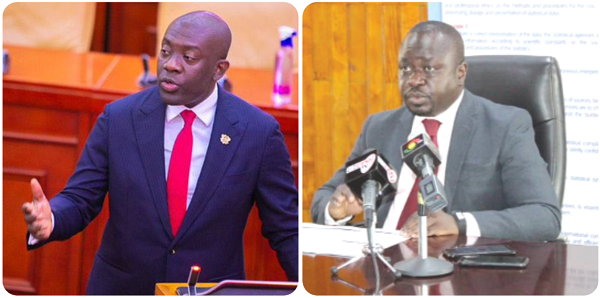
Economy rebounds faster - Govt quickens process towards pre-COVID era levels - Oppong Nkrumah
The government has assured the citizenry of a quicker turnaround in the economic fortunes of the country, after data has shown that the economy expanded at a faster rate than projected.
It has, therefore, asked the citizenry to have faith in it as it quickened the process to ease the challenges and return life back to the days before the onslaught of the COVID-19 pandemic in 2020.
The Minister of Information, Kojo Oppong Nkrumah, told the Daily Graphic yesterday that last year’s growth rate of 5.4 per cent was evidence that the economy was recovering from the COVID-19 pandemic faster than initially anticipated.
Mr Nkrumah said the government was now fast-tracking the implementation of strategic measures to build on last year’s growth and guide the economy out of the current challenges for the benefit of the citizenry.
He mentioned stronger collaboration with the private sector, prudent management of resources and a reduction in non-core spending as some of the initiatives being implemented by the government to restore the economy to stability and growth.
2021 Growth
Mr Nkrumah, who is the New Patriotic Party (NPP) Member of Parliament (MP) for Ofoase Ayirebi in the Eastern Region, was speaking after data had shown that economic growth for 2021 had beaten the forecasts.
Data from the Ghana Statistical Service (GSS) indicates that the economy expanded by 5.4 per cent last year as a result of strong growth in the third and the fourth quarters, as well as bullish recoveries in the agricultural and the services sectors.
The growth rate was higher than the government’s estimate of five per cent, which was later revised downwards to 4.4 per cent in the 2022 Budget Statement presented to Parliament last November.
The International Monetary Fund (IMF) and the World Bank had also projected that the economy would grow below five per cent last year.
At a news conference last Wednesday to release the 2021 gross domestic product (GDP), the Government Statistician, Prof. Samuel Kobina Annim, said the provisional data showed that the recovery was stronger than projected.
Prof. Annim, therefore, called for increased measures to accelerate and anchor the recovery.
Implications
In the interview that discussed the implications of the data and the way forward, Mr Nkrumah said the stronger-than-projected growth meant that Ghana’s macroeconomic indicators, such as the debt-to-GDP ratio and the fiscal deficit, were better than the government had initially projected.
He expressed the hope that the development would inspire confidence among investors and the international finance market in the economy and the policies of the government.
Accelerate PPPs
Mr Nkrumah said the GDP data for 2021 were also a confirmation that the government’s approach to economic recovery was credible.
He said following the fiscal consolidation that was rolled out, the government realised that growth in the public sector would be weakened.
To make up for the drop, he said, President Nana Addo Dankwa Akufo-Addo directed that the Ministry of Finance quicken the uptake of public-private partnerships (PPPs) to boost growth in the private sector.
“The Cabinet agreed that the Public Investment Division of the Ministry of Finance should be up and doing with PPP proposals before it, so that the growth can be quickened, even as we limit fiscal expansion,” he said.
Mr Nkrumah said the directive had since been implemented, resulting in increased activities in the manufacturing, agricultural and services sectors.
Going forward, he said, the government had decided to be more aggressive in supporting private sector initiatives.
“We need to be less intrusive in how the private sector operates through regulations and policies. We sometimes put impediments in their way by way of policy and regulations, but what we are saying as a government is that the public sector must work to facilitate their operations instead,” the Information Minister added.
